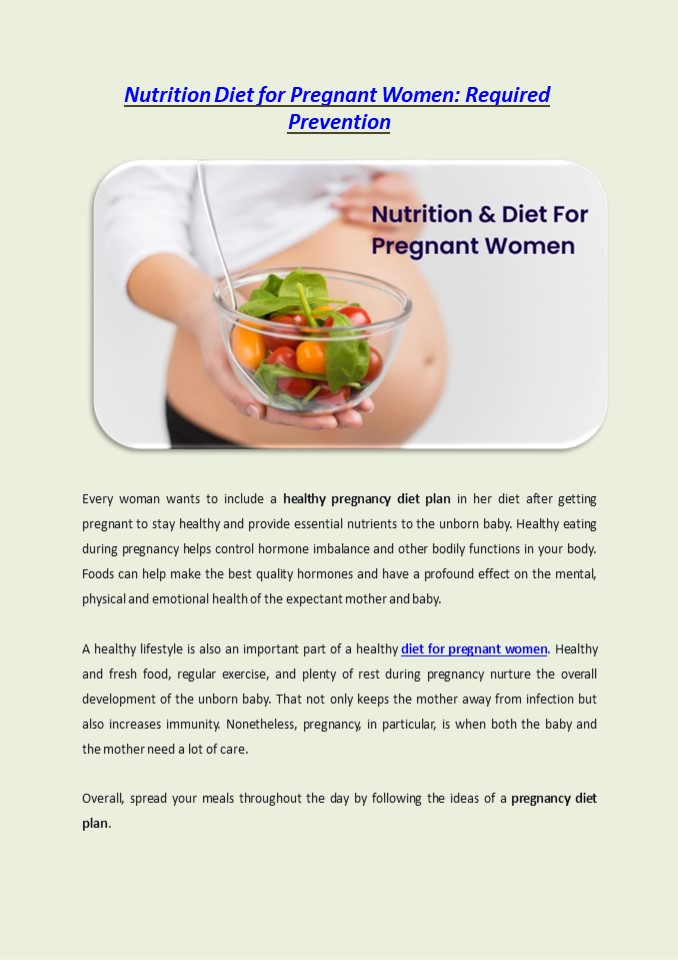Best Nutrition & Diet for Pregnant Women - 7Pranayama - PowerPoint PPT Presentation
Title:
Best Nutrition & Diet for Pregnant Women - 7Pranayama
Description:
Proper nutrition and a healthy diet can help to develop the health of a pregnant woman and her baby. A healthy lifestyle is an important part of a healthy diet for pregnant women. Here are some pregnancy super nutritious foods to ensure that you make your stomach and your baby happy with those nutrients. – PowerPoint PPT presentation
Number of Views:33
Title: Best Nutrition & Diet for Pregnant Women - 7Pranayama
1
Nutrition Diet for Pregnant Women Required
Prevention
Every woman wants to include a healthy pregnancy
diet plan in her diet after getting pregnant to
stay healthy and provide essential nutrients to
the unborn baby. Healthy eating during pregnancy
helps control hormone imbalance and other bodily
functions in your body. Foods can help make the
best quality hormones and have a profound effect
on the mental, physical and emotional health of
the expectant mother and baby. A healthy
lifestyle is also an important part of a healthy
diet for pregnant women. Healthy and fresh food,
regular exercise, and plenty of rest during
pregnancy nurture the overall development of the
unborn baby. That not only keeps the mother away
from infection but also increases immunity.
Nonetheless, pregnancy, in particular, is when
both the baby and the mother need a lot of
care. Overall, spread your meals throughout the
day by following the ideas of a pregnancy diet
plan.
2
Expert Tips on Pregnancy Diet Plan While planning
nutritious food for pregnant women, the focus
should be on all the nutrition you need while
pregnant. Such as
- Vitamins and minerals
- Protein-rich
- Fiber and fluids
- Folate and folic acid
- Monounsaturated and polyunsaturated fats
- Complex carbohydrates foods such as peas, beans,
whole grains, and vegetables - Here are some pregnancy super nutritious foods to
ensure that you make your stomach and your baby
happy with those nutrients. - Dairy Products
- Fat-free or low-fat yogurt
- skim milk
- soy milk
- paneer
- cheese
3
- We should consume dairy products regularly. They
are very important for the body. - Dairy products like milk, cheese, natto, soymilk,
and curd must be eaten during pregnancy. - Due to this, the body gets other essential
elements like calcium, vitamins, protein, and
phosphorus. And provides high amounts of
magnesium and zinc. All these nutrients help you
to strengthen the bones of the body. It also
strengthens teeth and muscles. - However, pasteurized dairy products should not be
consumed during pregnancy. If harmful bacteria
are present in this type of dairy product, then
it can harm the mother and the baby. - Legumes
- Lentils
- Pea
- beans
- Soybean
- Groundnut
- Chickpeas
- Legumes are very beneficial during pregnancy due
to the presence of flavonoids. - All these plant-based sources are very important
for you and your baby, especially in the early
days of pregnancy, because it strengthens the
baby's spinal cord and helps in the development
of the brain.
4
Choline is important in a baby's brain
development and contains a little bit of almost
every nutrient. It helps prevent developmental
abnormalities. Apart from this, Choline plays an
important role in the baby's liver function,
brain development, and nerve function and also
helps in keeping the metabolism healthy. Leafy
greens Include your pregnancy diet plate of dark,
green vegetables, such as kale, Broccoli,
Cabbage, Watercress, Collard Greens, chicory,
and spinach. Green vegetables pack a lot of
nutrients that you need during pregnancy. They
are also a bonanza of green goodness and rich in
fiber, vitamin C and K, calcium, iron, folate,
and potassium. Berries Berries in their small
packages have a relatively low glycemic index and
are packed with great vitamin C, fiber and
antioxidants. They contain water and fiber with
fewer calories that provide a lot of flavor and
nutrition when pregnant. Dry fruits Dry fruits
are generally high in calories, fiber, and
vitamins, and minerals. By eating them, you can
get a good intake of many important vitamins and
minerals, including folate, zinc, iron, and
potassium. Also, some dry fruits are rich in
fiber, potassium, and vitamin K. Like dates and
almonds. You can use dry fruits to satisfy food
cravings. Whole grains Unlike refined
counterparts, some whole grains such as whole
wheat and whole corn, oats, brown rice, and
quinoa are typically high in fiber, vitamins,
iron, magnesium, manganese, phosphorus,
selenium, and other plant compounds.
5
- It is common to have problems with gas and
constipation during pregnancy, but if you add
whole grains to your diet, they help remove your
gas and constipation to a great extent. Eating
foods high in fiber and whole grains will keep
you full and are nutritious. - Drink more water
- It is very important to stay hydrated during
pregnancy. In fact, during pregnancy, blood
volume increases. Your body also keeps your baby
hydrated, so expectant mothers must drink plenty
of water. - Apart from this, symptoms of mild dehydration are
also felt at times in pregnancy, such as
headache, fatigue, constipation, and mood swings. - Foods to Avoid During Pregnancy
- Avoid consuming unpasteurized milk and foods made
from unpasteurized milk. - Do not eat hot dogs and more meat
- Avoid eating raw and undercooked seafood, eggs
and meat. - Avoid eating high-fat things.
- Keep away from eating outside things, eating old
and packed things. - Avoid eating too much sugar and salt.
- Avoid the consumption of alcohol, coke, and soda.
- Quick smoking.

